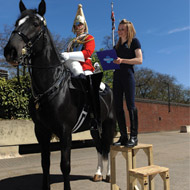Lameness remains a major problem for UK horses

The National Equine Health Survey (NEHS) has confirmed for the second year that lameness is the most common syndrome affecting the UK's horses and ponies. This year's results have also revealed an apparent increase in laminitis compared with previous years.
THE NEHS is the only survey that looks at the general health of horses, ponies, donkeys and mules in the UK. It aims to spot trends so that the main problems affecting equines can be seen in an effort to prevent them. Run annually by the Blue Cross, in partnership with BEVA, it is supported by the UK's leading equestrian organisations and charities - including the British Horse Society, the Horse Trust and Redwings.
Data was collected from 11,002 horses, ponies, donkeys and mules across the UK. The majority of horses reported (88 per cent) were kept in livery yards or private yards, with only 0.7 per cent kept by equine welfare charities.
This year's results revealed that almost one in five horses (18.5 per cent) were suffering with lameness due to joint diseases or other non-foot related problems. The results are consistent with last year's figure of 18.6 per cent.
The survey also highlighted that laminitis had a much higher prevalence than in previous years (7.1 per cent) with 43 per cent of these recorded as first episodes. Previous NEHS results showed a lower number of horses affected by laminitis, but the Blue Cross say that further work is needed to confirm if this increase is representative of the total horse population in the UK.
Gemma Taylor, education officer at Blue Cross explains: "The increase in laminitis may be linked to the mild winter, extensive rainfall and consistently warm spring. These conditions were ideal for flushes of grass growth, known to be a trigger for the disease"
The Blue Cross say that the annual surveys have shown consistent trends and have validated much of the accepted veterinary opinion, for example on lameness and colic.
To download a copy of the results, visit www.bluecross.org.uk



 The latest
The latest